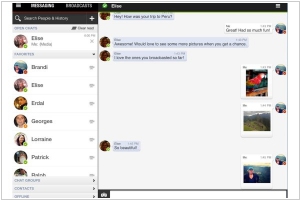Viber vs imo
March 09, 2025 | Author: Adam Levine
11★
Viber is a mobile app that provides free international calls and text messages to other Viber users using 3G or Wi-Fi. Uses your existing contact list - check out which of your phone contacts and friends is already on Viber so that you can call and text them for free.
0★
With audio and video calls in imo, you can have free and stable calls, send files, create groups.
See also:
Top 10 VoIP services for business
Top 10 VoIP services for business
Viber and imo are both messaging apps, which means they do more or less the same things—like letting people send texts, make calls and share stickers they will later regret sending. They both work on various devices, both promise encryption that may or may not save you from intergalactic surveillance and both allow group chats where you can be politely ignored by multiple people at once. Somewhere in the depths of the internet, they are competing fiercely for the affection of users who just want to send blurry photos of their lunch.
Viber, which began life in Israel in 2010 before being adopted by Japan’s Rakuten, has a penchant for security and secretive messages, possibly because its users are either spies or just really bad at remembering what they said. It also lets you call actual telephones, which in this digital age is as quaint as sending a telegram by carrier pigeon. Businesses seem to like it, especially in Europe, where people pretend they are using it for work but are really sending stickers of animated cats to their colleagues.
imo, meanwhile, was born in the USA in 2007 and immediately decided that high-speed internet was an optional luxury. It thrives in places where connectivity is about as reliable as a time-traveling sofa, making it a lifeline in South Asia, the Middle East and Africa. It backs up chats in the cloud, which is reassuring until you remember that clouds are mostly made of water and prone to disappearing. It also allows massive group video calls, proving that some people enjoy chaos and are willing to endure pixelated relatives shouting over each other in real time.
See also: Top 10 VoIP services
Viber, which began life in Israel in 2010 before being adopted by Japan’s Rakuten, has a penchant for security and secretive messages, possibly because its users are either spies or just really bad at remembering what they said. It also lets you call actual telephones, which in this digital age is as quaint as sending a telegram by carrier pigeon. Businesses seem to like it, especially in Europe, where people pretend they are using it for work but are really sending stickers of animated cats to their colleagues.
imo, meanwhile, was born in the USA in 2007 and immediately decided that high-speed internet was an optional luxury. It thrives in places where connectivity is about as reliable as a time-traveling sofa, making it a lifeline in South Asia, the Middle East and Africa. It backs up chats in the cloud, which is reassuring until you remember that clouds are mostly made of water and prone to disappearing. It also allows massive group video calls, proving that some people enjoy chaos and are willing to endure pixelated relatives shouting over each other in real time.
See also: Top 10 VoIP services





